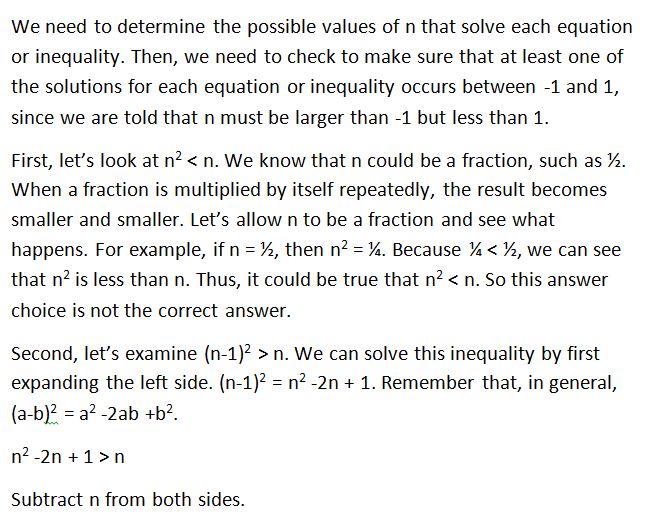All PSAT Math Resources
Example Questions
Example Question #11 : New Sat Math Calculator
Given the inequality above, which of the following MUST be true?


Subtract 7 from both sides:
Divide both sides by 
Remember to switch the inequality when dividing by a negative number:
Since 


Example Question #791 : Psat Mathematics
A factory packs cereal boxes. Before sealing each box, a machine weighs it to ensure that it is no lighter than 356 grams and no heavier than 364 grams. If the box holds 

The median weight of a box of cereal is 360 grams. This should be an allowable value of w. Substituting 360 for w into each answer choice, the only true results are:
and:
Notice that any positive value for w satisfies the second inequality above. Since w must be between 356 and 364, the first inequality above is the only reasonable choice.
Example Question #1 : How To Find The Solution To An Inequality With Addition
What values of x make the following statement true?
|x – 3| < 9
–6 < x < 12
–3 < x < 9
–12 < x < 6
x < 12
6 < x < 12
–6 < x < 12
Solve the inequality by adding 3 to both sides to get x < 12. Since it is absolute value, x – 3 > –9 must also be solved by adding 3 to both sides so: x > –6 so combined.
Example Question #2 : How To Find The Solution To An Inequality With Addition
If –1 < w < 1, all of the following must also be greater than –1 and less than 1 EXCEPT for which choice?
w/2
|w|0.5
|w|
w2
3w/2
3w/2
3w/2 will become greater than 1 as soon as w is greater than two thirds. It will likewise become less than –1 as soon as w is less than negative two thirds. All the other options always return values between –1 and 1.
Example Question #232 : Algebra
Solve for 
Absolute value problems always have two sides: one positive and one negative.
First, take the problem as is and drop the absolute value signs for the positive side: z – 3 ≥ 5. When the original inequality is multiplied by –1 we get z – 3 ≤ –5.
Solve each inequality separately to get z ≤ –2 or z ≥ 8 (the inequality sign flips when multiplying or dividing by a negative number).
We can verify the solution by substituting in 0 for z to see if we get a true or false statement. Since –3 ≥ 5 is always false we know we want the two outside inequalities, rather than their intersection.
Example Question #233 : Algebra
If 


To solve this problem, add the two equations together:
The only answer choice that satisfies this equation is 0, because 0 is less than 4.
Example Question #792 : Psat Mathematics
If 

-
In order to solve this inequality, you must isolate 
Therefore, the only option that solves the inequality is 
Example Question #21 : Inequalities
What values of 

First, solve the inequality 
Since we are dealing with absolute value, 
Example Question #56 : Equations / Inequalities
If –1 < n < 1, all of the following could be true EXCEPT:
(n-1)2 > n
n2 < n
16n2 - 1 = 0
|n2 - 1| > 1
n2 < 2n
|n2 - 1| > 1
Example Question #221 : Algebra
(√(8) / -x ) < 2. Which of the following values could be x?
All of the answers choices are valid.
-2
-1
-4
-3
-1
The equation simplifies to x > -1.41. -1 is the answer.
All PSAT Math Resources

































































